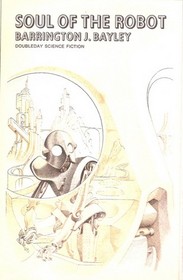If you check science fiction book review sites on the Internet you are likely to see Barrington J. Bayley as an unjustly overlooked master of the genre. He is often linked to the "new wave" movement of the 1960s, but this is largely inaccurate. His career was more in the 1970s and 1980s (and continues to this day). Like the "new wave" writers he was interested in ideas, and Bayley had lots of ideas. But he was very different from the "new wave" writers regarding accessabily. Bayley's novels are full of original, wild ideas, but his prose style is direct and easy to read. He DOES NOT play games with technique and intentionally make his books difficult or obscure.
In this novel a childless couple, who happen to be highly skilled roboticists, create a robot as a surrogate child. But instead of programing him to give them childlike unconditional love they program him with freedom of choice. Perhaps even free will.
This makes the robot Jasperodus unique. All other robots are created with a task in mind. Roboticists do not believe robots can have free will or a true free personality. Jasperodus believes he does have these qualities. This is a metaphysical question he attempts to answer. But it is a not a dry philosophical work. It's got lots of suprises, action, and comedy.
In some ways the book is similar to the "Roderick" books by John Sladek, except it is not as frenetic, and the comedy is not as extreme or over-the-top.
In this novel a childless couple, who happen to be highly skilled roboticists, create a robot as a surrogate child. But instead of programing him to give them childlike unconditional love they program him with freedom of choice. Perhaps even free will.
This makes the robot Jasperodus unique. All other robots are created with a task in mind. Roboticists do not believe robots can have free will or a true free personality. Jasperodus believes he does have these qualities. This is a metaphysical question he attempts to answer. But it is a not a dry philosophical work. It's got lots of suprises, action, and comedy.
In some ways the book is similar to the "Roderick" books by John Sladek, except it is not as frenetic, and the comedy is not as extreme or over-the-top.




